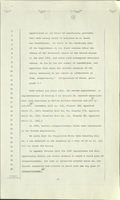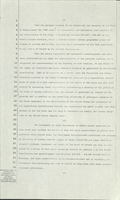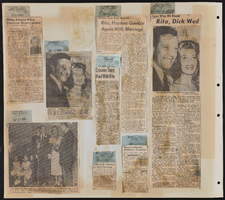Search the Special Collections and Archives Portal
Search Results
Lori Lipman Brown Papers
Identifier
Abstract
The Lori Lipman Brown Papers date from 1975 to 2009 and document former Nevada State Senator Lori Lipman Brown's political career. It includes correspondence and materials from Brown's service as a Nevada State Senator from 1992 to 1994, case files from her defamation lawsuit against Nevada State Senator Kathy Augustine, and papers from her work opposing the Nevada Question 2 ballot measure on same-sex marriage in 2000. The collection also contains photocopies of biographical materials and personal and publicity photographs of Brown, as well as material from her time working with local high school and commmunity theatre programs.
Archival Collection
Terry Wilsey Papers on the Las Vegas, Nevada LGBT Community
Identifier
Abstract
The Terry Wilsey Papers on the Las Vegas, Nevada LGBT Community (1979-2002) are comprised of records from the Las Vegas Gay Switchboard, the Nevadans for Human Rights, and other LGBT community groups based in Las Vegas, Nevada. The collection contains newsletters, agendas and meeting minutes, informational pamphlets, as well as photographs, programs, and a VHS recording of local theatre productions.
Archival Collection
Florence McClure Papers
Identifier
Abstract
The Florence McClure Papers (1969-2007) are comprised of writings, correspondence, newspaper clippings, handwritten notes, and assorted publications that focus on McClure's work with women's organizations, her efforts on behalf of the Southern Nevada Women's Correctional Facility, and her political advocacy work. It also contains a large number of reference clippings McClure collected on women's issues from local, national, and international publications.
Archival Collection
George Laurence Ullom Photograph Collection
Identifier
Abstract
The George Laurence Ullom Photograph Collection (1915-1974) contains photographic prints and negatives created by Las Vegas, Nevada photographer George Laurence "Larry" Ullom. Larry owned and operated Ullom’s Desert Art Studio, which was located in Las Vegas, Nevada. The bulk of the collection consists of Ullom's wedding chapel photography. The collection also includes his photography work for the Bureau of Reclamation, the Agricultural Extension Service, and the Associated Press, Atlantic News, and Acme news bureaus.
Archival Collection
Bob Weinstein Papers on Compulsive Gambling
Identifier
Abstract
The Bob Weinstein Papers on Compulsive Gambling (1945-2024) contain pamphlets, brochures, conference packets, promotional material, correspondence, and ephemera related to Weinstein's involvement in Gamblers Anonymous (G.A.). The collection contains G.A. recovery resources, workshop and training booklets, and meeting minutes and correspondence from Weinstein's time on the G.A. International Board of Trustees. Also contained in the collection are copies of correspondence from Jim W. (founder of Gamblers Anonymous) to Bill W. (a founder of Alcoholics Anonymous) and many books and other publications related to compulsive gambling.
Archival Collection
Florence and Jerry Vallen Faculty Papers
Identifier
Abstract
The Florence and Jerry Vallen Faculty Papers (approximately 1935-2017) are comprised of personal papers and research files for Florence and Jerry Vallen, the founding dean of the College of Hotel Administration at the University of Nevada, Las Vegas (UNLV). The collection includes research files and drafts for
Archival Collection

Amber Diskin oral history interview: transcript
Date
Archival Collection
Description
Oral history interview with Amber Diskin conducted by Barbara Tabach on January 5, 2018 for the Remembering 1 October Oral History Project. In this interview, Amber Diskin discusses her experience at the Route 91 Harvest music festival during the October 1, 2017 mass shooting in Las Vegas, Nevada. Diskin talks about finding her way home after escaping the crowds and letting her family and friends know she was not hurt. She speaks of the aftermath of the shooting, including how her children were affected, the post-traumatic stress disorder she developed, and how the shooting has affected her love of concerts. As a native Nevadan, she shares her views of Las Vegas and how her sense of community deepened after this event. Diskin ends the interview by discussing her appreciation for the first responders and the gift baskets she helped distribute to hospitals, police stations, and the fire department.
Text



